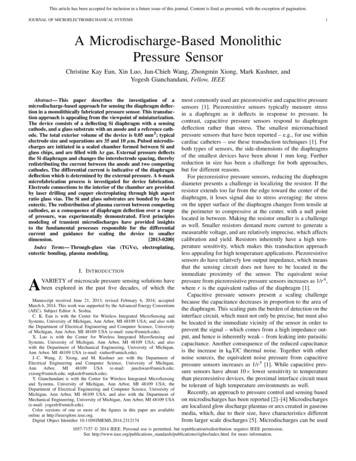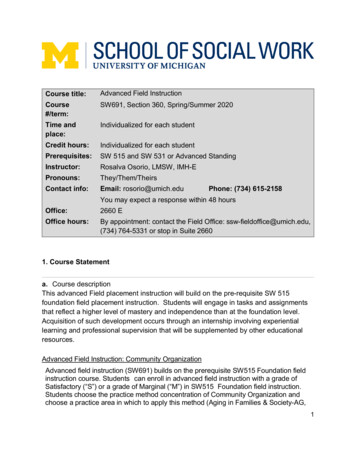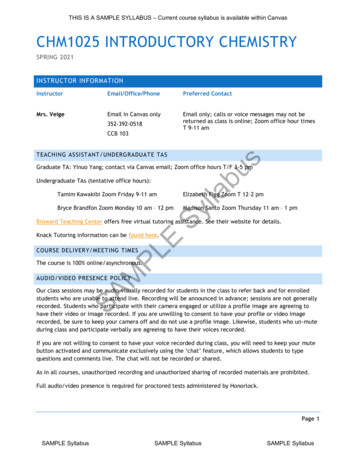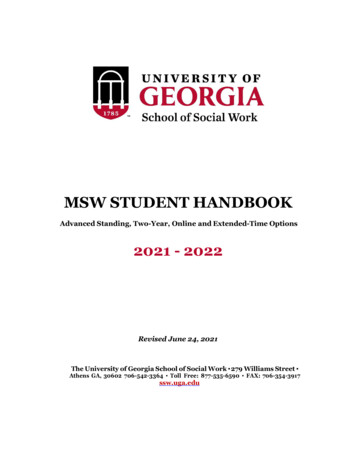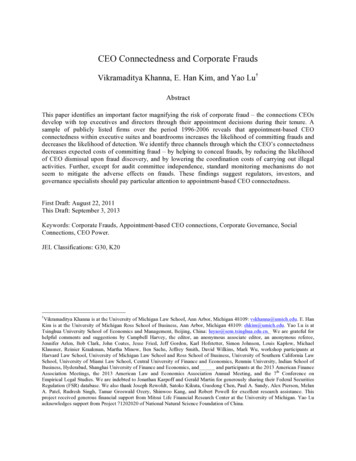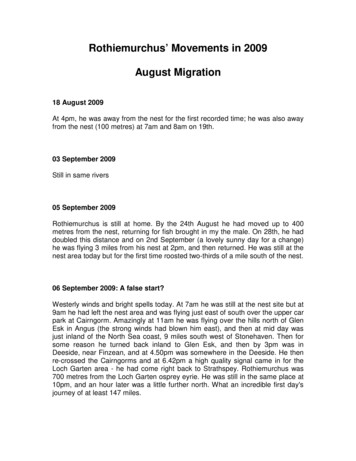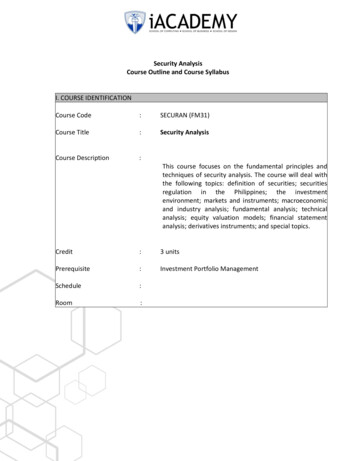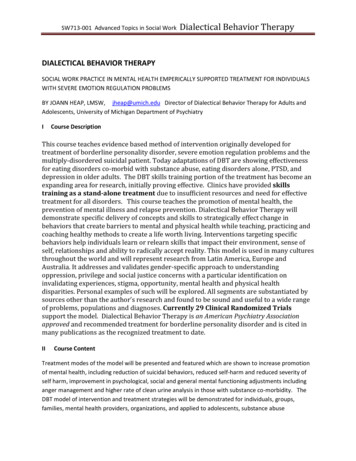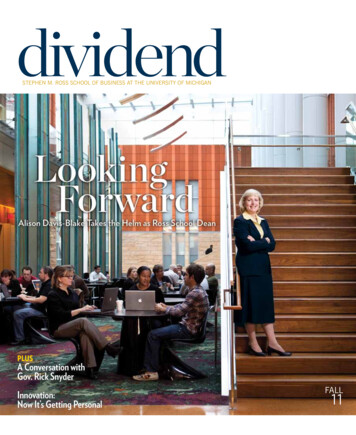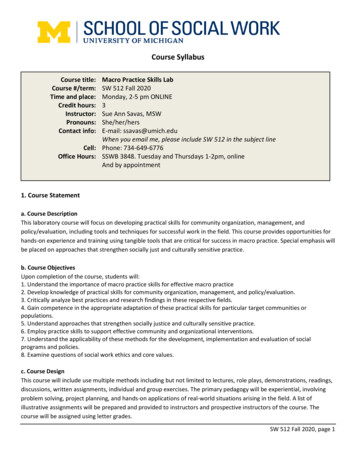
Transcription
Course SyllabusCourse title:Course #/term:Time and place:Credit hours:Instructor:Pronouns:Contact info:Macro Practice Skills LabSW 512 Fall 2020Monday, 2-5 pm ONLINE3Sue Ann Savas, MSWShe/her/hersE-mail: ssavas@umich.eduWhen you email me, please include SW 512 in the subject lineCell: Phone: 734-649-6776Office Hours: SSWB 3848. Tuesday and Thursdays 1-2pm, onlineAnd by appointment1. Course Statementa. Course DescriptionThis laboratory course will focus on developing practical skills for community organization, management, andpolicy/evaluation, including tools and techniques for successful work in the field. This course provides opportunities forhands-on experience and training using tangible tools that are critical for success in macro practice. Special emphasis willbe placed on approaches that strengthen socially just and culturally sensitive practice.b. Course ObjectivesUpon completion of the course, students will:1. Understand the importance of macro practice skills for effective macro practice2. Develop knowledge of practical skills for community organization, management, and policy/evaluation.3. Critically analyze best practices and research findings in these respective fields.4. Gain competence in the appropriate adaptation of these practical skills for particular target communities orpopulations.5. Understand approaches that strengthen socially justice and culturally sensitive practice.6. Employ practice skills to support effective community and organizational interventions.7. Understand the applicability of these methods for the development, implementation and evaluation of socialprograms and policies.8. Examine questions of social work ethics and core values.c. Course DesignThis course will include use multiple methods including but not limited to lectures, role plays, demonstrations, readings,discussions, written assignments, individual and group exercises. The primary pedagogy will be experiential, involvingproblem solving, project planning, and hands-on applications of real-world situations arising in the field. A list ofillustrative assignments will be prepared and provided to instructors and prospective instructors of the course. Thecourse will be assigned using letter grades.SW 512 Fall 2020, page 1
2. Class Requirementsa. Textbook & other readingsThis course will not use a primary text. The course readings include professional literature, videos, podcasts, and otherprofessional practice resources. All readings are posted to Canvas in modules (available one week before class). In orderto fully engage in the course, students are expected to complete all required readings. The information presented in thereadings and the online resources will be applied in class through exercises and demonstrated as practice skills throughassignments.b. Class ScheduleAn overview of each class session is presented next including the agenda, readings, relevant resources and assignmentdue dates. In order to be more responsive to student learning needs, some reading and exercise expectations will berevised. These changes in the schedule will be posted on canvas at least one week in advance. To support studentlearning and interests, additional on-line videos and podcasts will be posted on pages within modules one week prior tothe class session.Date1. Aug 31AgendaIntroduction tocourse, problemstatements andaction planning,GANTT chartsRequired ReadingsGeraldi, J, and Lechter, T. (2012) Gantt charts revisited: A critical analysis of its roots andimplications to the management of projects today International Journal of ManagingProjects in Business Vol. 5, Issue 4. 578-594. https://mgetit.lib.umich.edu/go/1523222NASW Press Guidelines for ople-nasw.pdfThe Needs Statement: 4 Fundamental Features. 2017. Grants Edge Teamhttps://www.grantsedge.com/needsstatement/#: :text 20a%20very%20distinct%20project.Scribbr How to write a problem statement. atement/Sept 7No Class2. Sept 14Working effectivelyin teams, problemsolving framework,using census data,key informantinterviewingUniversity HolidayCenter for Community Health and Development. University of Kansas. Community ToolBox. Collecting information about the problem. ormation/mainDetroit Future City 139 Square Miles Report. 17/07/DFC 139-SQ-Mile Report.pdfUM Library Research Guides: US Census and Demographic Information.https://guides.lib.umich.edu/censusSW 512 Fall 2020, page 2
DateAgendaRequired ReadingsHow to conduct a successful key informant interview. 2019. Upstream rview3. Sept 21AssessingCommunitiesPokagon Band of Potawatomi Indians. Request for Proposal. Community Assessment forthe Pokagon Tribal Victim Services Set-Aside Program. 2020http://guides.lib.umich.edu/censusUS Census, Making Sense of American Community SurveyGathering Information to Assess a fileSocial Explorer Mapping. https://www.socialexplorer.com/explore/mapsKrupar, S (2015). Map power and map methodologies for social justice. GeorgetownJournal of Public Affairs, 16 (2), 91-101.4. Sept 28AssessingOrganizationsAssignment#1 dueKozlowski, S. W. J., & Bell, B. S. (2013). Work groups and teams in organizations: Reviewupdate [Electronic version]. Retrieved Cornell University, School of Industrial and LaborRelations site: Chongmyoung Lee, Branda Nowell (2014). A Framework for Assessing the Performanceof Nonprofit Organizations. American Journal of Evaluation.Leap Ambassadors Performance Imperative performance-imperative/5. Oct 5Problem Analysis,Root Cause AnalysisTechniquesBright, C., Cozart, T., Bagley, B., Scott, H., Dennis, J. (2019) Social Network GapAnalysis Evaluation. Journal of Family & Community Health. Volume 42, Issue 1, p 44-53.About Root Cause Analysis. sisRyan, K. Gandha, T, Cubertson, M. and Carlson, C. (2014). Focus Group Evidence:Implications for Design and Analysis. American Journal of Evaluation, Vol 35(3), 328-345Liberating Structures. http://www.liberatingstructures.com/SW 512 Fall 2020, page 3
Date6. Oct 12AgendaSolution Finding:Design Thinking,Change EffortAction Planning,Group decisionmakingRequired ReadingsSprague Martinez, L., Richards-Schuster, K., Teixeira, S., Augsberger, A. (2018). The Powerof Prevention and Youth Voice: A Strategy for Social Work to Ensure Youths’ HealthyDevelopment. Social Work, Volume 63, Issue 2, pp 135-143https://doi.org/10.1093/sw/swx059Design Thinking for Social Innovation IDEO. Brown, T. and Wyatt, J.Design Thinking for SocialInnovation2.pdfAction with Communities in Rural England: Rural evidence project St. Ives Settlement,2012.7. Oct 19Data visualizationAssignment#2 dueKnaflic, C. (2015) Storytelling with Data: A Data Visualization Guide for BusinessProfessionals. Wiley and Sons: New Jersey.Healy, K and Moody, J. (2014) Data Visualization in Sociology. Annual Review ofSociology. 40:1, 105-128.Evergreen, S. (2017) Effective Data Visualization: The Right Chart for the Right Data. SagePublications Inc.Emery, A. (2017) Six Ideas for Displaying Qualitative Data. http://annkemery.com/qualdataviz/8. Oct 26Budgeting andresource allocationExcel: BasicsExcel: Working with Cells and SheetsExcel: Formulas and FunctionsExcel: Working with DataUsing a Program Budget Tool, YouTube, Program-based Budget Builder for Nonprofits.https://www.youtube.com/watch?v EOwxhTQSungHow to create a budget SpreadsheetGood to Great and the Social Sectors: Jim Collins on Leadership. www.bridgestar.org9. Nov 2Assignment#3 dueFund DevelopmentWhat should your fund development plan include?2012. Non-profit Quarterly. Joyauk, tion for Community Living. Engaging Older Adults undation Directory Online.https://guides.lib.umich.edu/c.php?g 283405&p 1888659#s-lg-box-wrapper-10664787SW 512 Fall 2020, page 4
DateAgendaRequired ReadingsImpact India: Philanthropy’s New Frontier—Impact Investing. Etzel. M. 2015. StanfordSocial Innovation ys new frontierimpact investing10. Nov 9Professionalpresentations,InfographicsSlidedocs for effective visual reporting.https://www.youtube.com/watch?v X09lcL4PFxwSmiciklas, M. (2012) The Power of Infographics: Using Pictures to Communicate andConnect with your AudiencesResler, M. (2015) Infographics: Visually Express Your Community Engaged Data,Community Engagement Institute at Virginia Commonwealth University ScholarsCompass. http://scholarscompass.vcu.edu/cenrinstituteHow to Design an Infographic from Scratch. hics/Canva for making infographics. www.canva.comPiktochart for making infographics. www.piktochart.comInfographic Examples: Meals on Wheels Ypsilanti, Ann Arbor Center for Independent Living Silence Equals Death oster11. Nov 16Program evaluationcapacity, trackingoperational andoutcome metricsCunningham, K. and Ricks, M. Why Measure? Non-profits use metrics to show they areefficient. Stanford Social Innovation Review. https://ssir.org/articles/entry/why measureImproving Management Effectiveness through fm?coursenum 9559aNishimura, A, Sampath, R. Le, V, Sheikh, A. and Valenzuela, A. (2020) TransformationalCapacity Building, Stanford Social Innovation Review, V18, N4.Nov 23No ClassUniversity Holiday12. Nov 30PresentationsPeer Feedback13. Dec 7Assignment#4 duePresentations,Course Wrap-upPeer FeedbackSW 512 Fall 2020, page 5
c. AssignmentsStudents will have time to work on assignments in class in order to receive coaching from peers and the instructor.Students will have an opportunity to share their products and gather feedback on their deliverables from their groupmembers and/or the instructor. Individual student work products/assignments will be uploaded to canvas for grading.AssignmentDue dateSubmit assignment on CanvasPercent of overallgrade1. Key Informant InterviewSeptember 2820%2. Root Cause AnalysisOctober 1920%3. Budget and NarrativeNovember 920%4. Coaching SimulationDecember 720%Class ParticipationInstructor Rating20%Assignment 1: Key Informant InterviewStudents will work individually to develop key informant interviewing skills. 1) Develop written interview script, 2) Thestudent will conduct a “no contact interview” with a stakeholder to inform their project, 3) The student will usequalitative analysis techniques to theme the results (written), 4). use 200 words to reflect on the KI process andlearning. All components will be submitted in one document to the canvas assignment folder for grading.Assignment 2: Root Cause AnalysisStudents will work individually to develop a 2 page written tip sheet for one root cause analysis strategy. The tip sheetwill include the origins of the technique, the steps, limitations, and considerations for specific circumstances. The tipsheet along with a summary of two examples of others use of the technique will be included. The tip sheet will beshared with the class at the end of the course.Assignment 3: Budget and NarrativeStudents will work individually to develop a budget for a macro event. The details of the event will be provided to thestudents. A budget spreadsheet and corresponding budget narrative will be submitted to the canvas assignment folderfor grading.Assignment 4: Coaching SimulationStudents will complete the Coaching and Supervision session with a competency score of at least 75%.d. Attendance and class participationClass attendance is imperative for both your own learning and the learning of your peers, and certainly for my learning. Iexpect students to attend class and small group sessions. Excessive absences (more than 2) will result in a lower grade.Routine tardiness will also reduce your participation grade. If personal or professional circumstances require yourabsence from more than one class, please contact me as soon as possible. Note that, even if you are absent from a class,you are still responsible for the content and the required assignments due that day. Please review the Policy on ClassAttendance found in the MSW Student Guide.Class participation is more than attending the sessions. Participation includes preparation for class by doing the readingsand completing draft assignments. Participation includes asking questions of the instructor and of your classmates.SW 512 Fall 2020, page 6
Participation includes contributing fully to your group project. Participation includes participating in at least one on-linecommunity event or conversations The event options will be provided by the instructor or can be identified by thestudent.e. GradingFinal grades are based on 100 percentage points. Letter grades are assigned to point totals according to the point tograde chart below. Assignments are due on or before the dates listed on the syllabus and on Canvas, except wherenoted. Please submit all work on time. Except where indicated, late assignments will be penalized 1/3 of a letter gradefor the first day past the due date and time, and a full letter grade for each additional day thereafter. I am not inclined towaive this policy, though I do understand there may be exceptional circumstances. Note: assignments are due by 5pm.Additional MSW policies are available in the Student Guide: Grades in Academic Courses and in Field Instruction,Student Grievance procedures, policy for grading in special circumstances.10094-9991-93A AA-88-9084-8781-83B BB-78-8074-7771-73C CC-68-7064-67 64D DEf. Class Recording and Course MaterialsAudio and video recording of in-class lectures and discussions is prohibited without the advance written permission ofthe instructor. Students with an approved accommodation from the Office of Services for Students with Disabilitiespermitting the recording of class meetings must present documentation to the instructor in advance of any recordingbeing done. The instructor reserves the right to disallow recording for a portion of any class time where privacy is aspecial concern. If the instructor chooses to record a class, they will decide which classes, if any, are recorded, whatportion of each class is recorded, and whether a recording is made available on the course management website. Ondays when classes are recorded, students will be notified a recording is occurring. Class recordings and course materialsmay not be reproduced, sold, published or distributed to others, in whole or in part, without the written consent of theinstructor.] Additional information on class recordings can be found the Recording and Privacy Concerns FAQg. COVID-19 StatementFor the safety of all students, faculty, and staff on campus, it is important for each of us to be mindful of safety measuresthat have been put in place for our protection. By returning to campus, you have acknowledged your responsibility forprotecting the collective health of our community. Your participation in this course on an in-person/hybrid basis isconditional upon your adherence to all safety measures mandated by the state of Michigan and the University, includingmaintaining physical distancing of six feet from others, and properly wearing a face covering in class. Other applicablesafety measures may be described in the Wolverine Culture of Care and the University’s Face Covering Policy for COVID19. Your ability to participate in this course in-person/hybrid may be impacted by failure to comply with campus safetymeasures. Individuals seeking to request an accommodation related to the face covering requirement under theAmericans with Disabilities Act should contact the Office for Institutional Equity. If you are unable or unwilling to adhereto these safety measures while in a face-to-face class setting, you will be required to participate on a remote basis. Ialso encourage you to review the Statement of Student Rights and Responsibilities and the COVID-related Addendumto the Statement of Student Rights and Responsibilities.SW 512 Fall 2020, page 7
h. Health Related Class AbsencesPlease evaluate your own health status regularly and refrain from attending class and coming to campus if you are ill.You are encouraged to seek appropriate medical attention for treatment. School of Social Work students who miss classdue to illness of any kind will be given opportunities to access course materials online or provided with alternativelearning opportunities. Please notify me by email about your absence as soon as practical, so that I can makeaccommodations. Please note that documentation (a Doctor’s note) for medical excuses is not required.Additional School and University policies, information and resources are available mation-resources. They include: Safety and emergency preparednessMental health and well-beingTeaching evaluationsProper use of names and pronounsAccommodations for students with disabilitiesReligious/spiritual observancesMilitary deploymentWriting skills and expectationsAcademic integrityInstructor Teaching PhilosophyAdapted from Rosenshine, B. Research-based Strategies that All Teachers Should Know, American Educator (Spring2012).I will begin each session with a review of what was covered the previous lecture. Students will be asked to provide thereview of key concepts and “take-aways.” I will present material in small steps and provide class time for students topractice after each step. I will give clear instructions. I will provide models, templates and numerous examples ofproblem-solving, including rehearsal time. I will think aloud as I demonstrate. I will provide scaffolds for difficult tasksand notify students of possible errors. I will guide student practice through additional explanations, live review of drafts,and small group consultations. I will monitor students for understanding by asking specific questions and checkingstudent responses. I will reteach material when necessary. I will teach material needed by students even when thestudents were expected to have mastered the material prior to the course. I will note student successes and givestudents ample opportunity to practice independently. I will provide feedback as students begin to practiceindependently. I will teach using a transparent and inclusive approach.I use an engaged active learning approach and partner with the community to address real social work realatedchallenges. In addition to the course objectives and the CSWE competencies, we work to develop the followingUniversity of Michigan engaged learning student outcomes: (1) self-agency and innovation, (2) collaboration,communication, and teamwork, (3) social/civic responsibility and ethical reasoning, (4) intercultural engagement, (5)creativity.SW 512 Fall 2020, page 8
Sue Ann Savas, MSW She/her/hers E-mail: ssavas@umich.edu When you email me, please include SW 512 in the subject line Phone: 734-649-6776 SSWB 3848. Tuesday and Thursdays 1-2pm, online And by appointment 1. Course Statement a. Course Description

